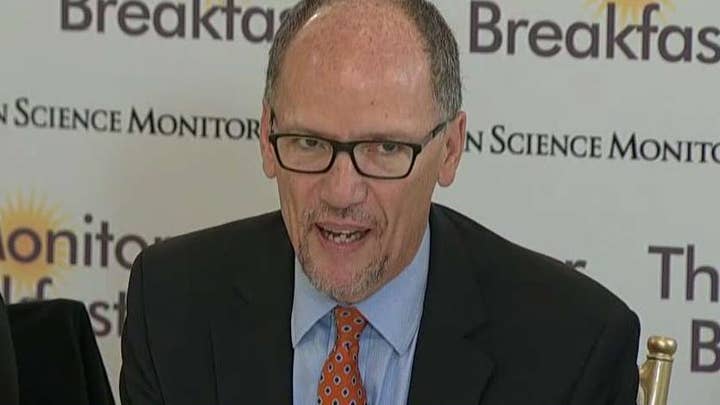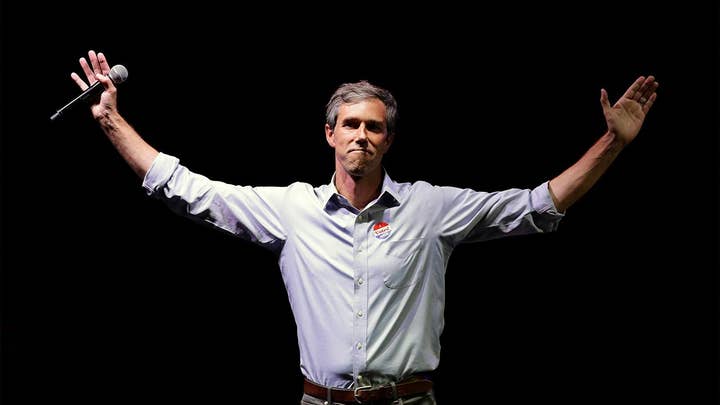Democrats are on a high after winning back the House last month, but they have a looming problem they know they need to address: data. Specifically, getting all their voter data under one proverbial roof.
Heading into 2018, Democrats made a concerted effort to build a voter database that could compete with President Trump’s campaign operation and the sophisticated data-sharing program they have with the Republican National Committee. But, the Democratic National Committee is looking to take that a step further by unifying its data under one for-profit operation – but it's prompted pushback among state party leaders, according to Politico. The state party leaders reportedly fear losing ownership rights of this data to a large, national operation, while the DNC says bringing the data from outside groups together with state parties would create a more powerful tool looking ahead to 2020.
The problem for Democrats is not necessarily a lack of data.
DNC officials moved to ramp up their voter engagement program, IWillVote, ahead of the 2018 races. The program reached over 60 million people in the 2018 midterms. They did so by connecting with voters at events like March for Our Lives – though the DNC is not directly affiliated with it – to encourage people to fill out voter commitment cards. Through those cards, the DNC was able to collect personal information.
Anyone who committed to vote was then part of a digital “chase” program that used text and email methods to send people personalized information on their polling places -- the first fully digital commit-to-vote and chase program of its time, according to one official.
"From Women's Marches to rallies in Congress, the DNC has organized around large grassroots gatherings to engage voters and harness the enthusiasm on the ground to translate to votes at the ballot box,” DNC spokeswoman Sabrina Singh said.
The party also purchased over 110 million cell phone numbers to add to its voter file, collecting every available number for registered voters across the country. The DNC used these numbers to get out the vote in key races, contacting and encouraging less-frequent voters to turn out.
"Throughout the year, the DNC used this data to send more than 15 million state-specific peer-to-peer text messages through DNC-funded programs to engage voters to turn out in the midterm election,” Singh said.
According to Democratic strategists, however, the problem going forward is a lack of unity.
“If Democrats want any chance of winning in 2020 then we better get on the same page,” said a senior Democratic strategist and former state party official.
Much of the data on the Democratic side has come from marches and other political movements that turned their issue-based outreach into operations to get out the vote in the 2018 midterms. The Women’s March created the Power to the Polls effort to mobilize and register voters. The group also hosted “Call Your Sister” phone-banking events across the country that encouraged women to contact other women.
But, these are not run by the party.
HERE'S WHO TOPS 2020 IOWA DEMOCRATIC CAUCUS POLL
When compared with the RNC’s massive voter operation -- which works in unison with the Trump campaign and the state party officials -- this could put the Democrats at a disadvantage looking toward 2020 because they wouldn’t have as much compiled data for the eventual nominee.
The former state party official who spoke with Fox News said the last time the DNC was truly unified in its data operation was under former chairman Howard Dean, when the party had a 50-state strategy. Dean left his post in 2009.
Doug Schoen, a Democratic strategist and Fox News contributor, agreed that the party would be better off if the data was under one operation -- but he acknowledged that would be unlikely.
"Given the divisions in the party, and the mutual mistrust that exists between state and local parties, I doubt that this will ever, in fact, happen," he said.
POTENTIAL 2020 HOPEFUL SAYS TRUMP'S DAYS OF 'PRESIDENTIAL IMMUNITY' ARE OVER
Strategists have disagreed about whether Democrats are under pressure to compete with Trump’s operation and rally events.
The former state leader said that digital guru Brad Parscale’s new role as head of the 2020 Trump campaign should make Democrats nervous, while another said the recent midterms showed Democrats can compete in their own way.
“I think we did a pretty great job of that in the midterms and will be spending even more in a presidential cycle,” said Jessica Tarlov, a Democratic strategist and Fox News contributor. “We don't need to fight him with rallies of the same size. They're really only good for the crowd that's there and they're his die-hard supporters.”
She added that since the president is running for re-election, the rallies will mean less in terms of attracting support and predicted that they will also not be televised as much, which would mean less exposure.
“I think with Trump as a known quantity after four years in office, the rallies matter a lot less. He's not being introduced to any new audiences,” Tarlov said.
Fox News' Peter Doocy contributed to this report.















































